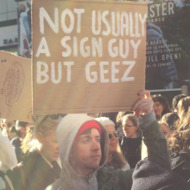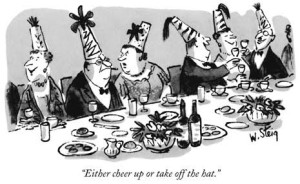Protestor outside Trump Tower after U.S. presidential election,
November 2016; the photo went viral
31 December 2016 (Milos, Greece) – Yes, yes, yes. I know. There have been far worse years in history. And, yes, it is in our (and the media’s) nature to give too much weight to bad, short-term news. Sure, you can take solace in the vast longer-term strides humanity has made, or in devil-may-care existential nihilism, or in hopeful bromides – the arc of the moral universe, yadda yadda. Choose your flavor of forced optimism, and indulge in it all you want.
But by any objective measure, this has still been an awful year.
And it is not just because of Aleppo, Brussels, Nice, Orlando, and all the other milestones in carnage. Nor because of the rise of Trump, Farage, Le Pen, Fillon, Duterte, and other merchants of hatred. Nor even because a newly isolationist U.S., a resurgent Russia, and an aggressive China are about to take the world’s geopolitical balance and shake it like a snow-globe. I suspect it may take decades to comprehend the true impact of the year’s revolution and chaos.
Nor because we’re living through the first world cyberwar – but we just haven’t called it that yet. Nation states have been attacking each other electronically for a decade or more. Historians will eventually give it a name and a start and end date.
No, to me a bigger issue: this has been the year of post-truth, when the combined effects of polarizing social media, weakening traditional media, shameless politicians, and economic and political tribalism reached their logical destination. In countries whose systems of governance were premised on at least a veneer of reasoned debate about mutually agreed-on facts, the scope for such debate is shrinking fast.
This is fundamental. Don’t like the way the world is going? Want to change it? How do you convince people if they won’t even hear you? The stock of available reality has narrowed.
And the question of destiny may soon move on to another form (epigenetics, anyone?). The AI Frankenstein is coming into focus, and it, too, is not quite what we thought. We have learned that we can no more understand our smartest robots than we can ourselves. But we have also confirmed that humans have robots beat in the sheer efficiency with which we can learn.
I was in Zurich in March attending my artificial intelligence program at the Swiss Federal Institute of Technology during the live feed from Korea of the Deepmind AlphaGo computer program challenge against Lee Se-dol, the South Korean professional Go player considered to be the best human player. It was the perfect venue from which to watch the games.
There were petabytes of analysis after AlphaGo beat Sedol. My biggest take-away was the story related by Se-dol’s wife. She said after the series was over, Se-dol had nightmares. Not about AlphaGo’s move choices, exactly. But about Aja Huang, one of AlphaGo’s lead programmers, and the guy sitting across from Se-dol who actually physically placed AlphaGo’s pieces on the board.
I was reminded of an excerpt from Kevin Kelly’s new book The Inevitable wherein he points out that, yes, today’s best chess players are not human, but they are also not robotic. They are humans assisted by computers.
When we worry about AI, we should worry about our neighbor using it better than we do. In this sense, we have been prescient in giving Victor Frankenstein’s monster the name of his creator. They are Frankenstein, together.
So yes; things are bad, and it’s foolish to pretend otherwise. But it’s equally foolish to wallow in despair. My wife’s instant message to me earlier today:
Whether history records 2016 as the start of a new age of darkness (ok, my view), or just the darkness before a new dawn, it is still up to us -each one of us.
For me, some silence in early 2017, spending a lot of time on my rock in the middle of the Mediterranean Sea, leaving the nuts and bolts of my business affairs to my staff who now have a percentage of the business.
Because the human brain evolved with significant and prolonged periods of silence. There is a significant body of research that indicates for us to function at our peak and during reflection we require periods of quiet, to disengage from the daily noise. Otherwise the brain is working all the time.
All the best to you and yours.
Happy New Year


